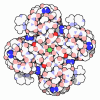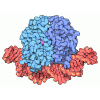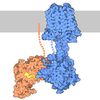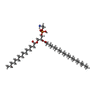[English] 日本語
 Yorodumi
Yorodumi- PDB-7wsw: Cryo-EM structure of the Potassium channel AKT1 from Arabidopsis ... -
+ Open data
Open data
- Basic information
Basic information
| Entry | Database: PDB / ID: 7wsw | |||||||||||||||
|---|---|---|---|---|---|---|---|---|---|---|---|---|---|---|---|---|
| Title | Cryo-EM structure of the Potassium channel AKT1 from Arabidopsis thaliana | |||||||||||||||
 Components Components | Potassium channel AKT1 | |||||||||||||||
 Keywords Keywords | MEMBRANE PROTEIN / Complex / Potassium channel | |||||||||||||||
| Function / homology |  Function and homology information Function and homology informationroot hair elongation / regulation of stomatal closure / response to water deprivation / inward rectifier potassium channel activity / potassium ion import across plasma membrane / monoatomic ion channel complex / response to salt stress / potassium ion transport / identical protein binding / plasma membrane Similarity search - Function | |||||||||||||||
| Biological species |  | |||||||||||||||
| Method | ELECTRON MICROSCOPY / single particle reconstruction / cryo EM / Resolution: 3.4 Å | |||||||||||||||
 Authors Authors | Yang, G.H. / Lu, Y.M. / Zhang, Y.M. / Jia, Y.T. / Li, X.M. / Lei, J.L. | |||||||||||||||
| Funding support | 1items
| |||||||||||||||
 Citation Citation |  Journal: Nat Commun / Year: 2022 Journal: Nat Commun / Year: 2022Title: Structural basis for the activity regulation of a potassium channel AKT1 from Arabidopsis. Authors: Yaming Lu / Miao Yu / Yutian Jia / Fan Yang / Yanming Zhang / Xia Xu / Xiaomin Li / Fan Yang / Jianlin Lei / Yi Wang / Guanghui Yang /  Abstract: The voltage-gated potassium channel AKT1 is responsible for primary K uptake in Arabidopsis roots. AKT1 is functionally activated through phosphorylation and negatively regulated by a potassium ...The voltage-gated potassium channel AKT1 is responsible for primary K uptake in Arabidopsis roots. AKT1 is functionally activated through phosphorylation and negatively regulated by a potassium channel α-subunit AtKC1. However, the molecular basis for the modulation mechanism remains unclear. Here we report the structures of AKT1, phosphorylated-AKT1, a constitutively-active variant, and AKT1-AtKC1 complex. AKT1 is assembled in 2-fold symmetry at the cytoplasmic domain. Such organization appears to sterically hinder the reorientation of C-linkers during ion permeation. Phosphorylated-AKT1 adopts an alternate 4-fold symmetric conformation at cytoplasmic domain, which indicates conformational changes associated with symmetry switch during channel activation. To corroborate this finding, we perform structure-guided mutagenesis to disrupt the dimeric interface and identify a constitutively-active variant Asp379Ala mediates K permeation independently of phosphorylation. This variant predominantly adopts a 4-fold symmetric conformation. Furthermore, the AKT1-AtKC1 complex assembles in 2-fold symmetry. Together, our work reveals structural insight into the regulatory mechanism for AKT1. | |||||||||||||||
| History |
|
- Structure visualization
Structure visualization
| Structure viewer | Molecule:  Molmil Molmil Jmol/JSmol Jmol/JSmol |
|---|
- Downloads & links
Downloads & links
- Download
Download
| PDBx/mmCIF format |  7wsw.cif.gz 7wsw.cif.gz | 368.3 KB | Display |  PDBx/mmCIF format PDBx/mmCIF format |
|---|---|---|---|---|
| PDB format |  pdb7wsw.ent.gz pdb7wsw.ent.gz | 279 KB | Display |  PDB format PDB format |
| PDBx/mmJSON format |  7wsw.json.gz 7wsw.json.gz | Tree view |  PDBx/mmJSON format PDBx/mmJSON format | |
| Others |  Other downloads Other downloads |
-Validation report
| Arichive directory |  https://data.pdbj.org/pub/pdb/validation_reports/ws/7wsw https://data.pdbj.org/pub/pdb/validation_reports/ws/7wsw ftp://data.pdbj.org/pub/pdb/validation_reports/ws/7wsw ftp://data.pdbj.org/pub/pdb/validation_reports/ws/7wsw | HTTPS FTP |
|---|
-Related structure data
| Related structure data |  32769MC  7fcvC 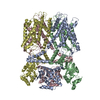 7xufC M: map data used to model this data C: citing same article ( |
|---|---|
| Similar structure data | Similarity search - Function & homology  F&H Search F&H Search |
- Links
Links
- Assembly
Assembly
| Deposited unit | 
|
|---|---|
| 1 |
|
- Components
Components
| #1: Protein | Mass: 99413.938 Da / Num. of mol.: 4 Source method: isolated from a genetically manipulated source Source: (gene. exp.)   #2: Chemical | ChemComp-PTY / #3: Chemical | Has ligand of interest | N | Has protein modification | N | |
|---|
-Experimental details
-Experiment
| Experiment | Method: ELECTRON MICROSCOPY |
|---|---|
| EM experiment | Aggregation state: PARTICLE / 3D reconstruction method: single particle reconstruction |
- Sample preparation
Sample preparation
| Component | Name: The Potassium channel AKT1 from Arabidopsis thaliana / Type: COMPLEX / Entity ID: #1 / Source: RECOMBINANT |
|---|---|
| Source (natural) | Organism:  |
| Source (recombinant) | Organism:  |
| Buffer solution | pH: 7.4 |
| Specimen | Embedding applied: NO / Shadowing applied: NO / Staining applied: NO / Vitrification applied: YES |
| Vitrification | Cryogen name: ETHANE |
- Electron microscopy imaging
Electron microscopy imaging
| Experimental equipment |  Model: Titan Krios / Image courtesy: FEI Company |
|---|---|
| Microscopy | Model: FEI TITAN KRIOS |
| Electron gun | Electron source:  FIELD EMISSION GUN / Accelerating voltage: 300 kV / Illumination mode: FLOOD BEAM FIELD EMISSION GUN / Accelerating voltage: 300 kV / Illumination mode: FLOOD BEAM |
| Electron lens | Mode: BRIGHT FIELD / Nominal defocus max: 1800 nm / Nominal defocus min: 1500 nm |
| Image recording | Electron dose: 1.5625 e/Å2 / Film or detector model: GATAN K2 SUMMIT (4k x 4k) |
- Processing
Processing
| Software | Name: PHENIX / Version: 1.19.1_4122: / Classification: refinement | ||||||||||||||||||||||||
|---|---|---|---|---|---|---|---|---|---|---|---|---|---|---|---|---|---|---|---|---|---|---|---|---|---|
| EM software | Name: PHENIX / Category: model refinement | ||||||||||||||||||||||||
| CTF correction | Type: NONE | ||||||||||||||||||||||||
| 3D reconstruction | Resolution: 3.4 Å / Resolution method: FSC 0.143 CUT-OFF / Num. of particles: 181714 / Symmetry type: POINT | ||||||||||||||||||||||||
| Refinement | Highest resolution: 3.4 Å | ||||||||||||||||||||||||
| Refine LS restraints |
|
 Movie
Movie Controller
Controller




 PDBj
PDBj